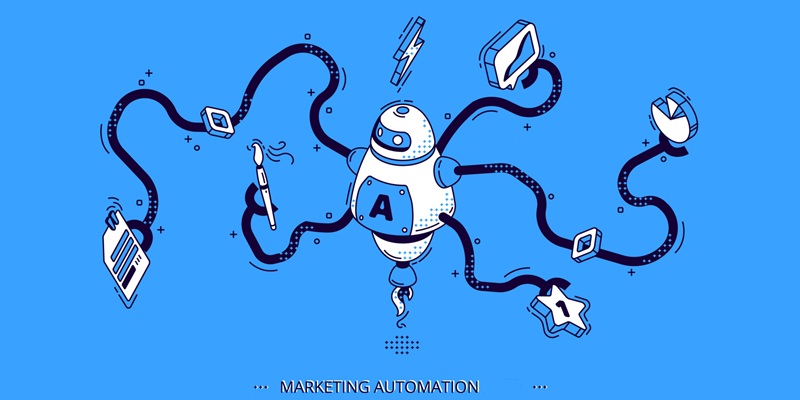In today’s fast-paced digital world, businesses are constantly looking for ways to optimize their sales and marketing processes. This is where marketing automation comes into play. Marketing automation is a technology-driven approach that streamlines repetitive marketing activities and eliminates extraneous tasks based on a predefined sales or marketing process. By automating these processes, companies can save time and resources, while also improving efficiency and effectiveness. Let’s delve deeper into the various aspects of marketing automation and explore how it can revolutionize your business.
Capturing and Utilizing Relevant Data
In this era of data-driven marketing, capturing and utilizing relevant data is crucial for a company’s success. Marketing automation software is a powerful tool that can capture relevant data when a prospective client visits a company’s website. This data can include information such as their browsing behavior, interests, and preferences. Using this information, the marketing automation tool assigns the customer to a specific campaign where they receive automated emails with personalized content. By harnessing this data intelligently, companies can engage their prospects and customers with more tailored messaging, enhancing the overall customer experience.
Automation across Multiple Channels
Marketing automation doesn’t stop at capturing and utilizing data from a website. It can be extended to other channels as well. Social media platforms play a significant role in today’s marketing landscape, and automation can help businesses maintain a strong presence on these platforms. With marketing automation, the system can respond to follows on Instagram, TikTok, Twitter, and other platforms. This allows businesses to engage with their audience promptly and efficiently, establishing a seamless connection and enhancing brand loyalty.
Customer Segmentation: Targeted Marketing Made Easy
One of the key benefits of marketing automation is its ability to help companies with customer segmentation. By analyzing customer data, companies can divide their customer base into specific segments based on demographics, preferences, or behaviors. This segmentation allows for targeted marketing, ensuring that the right message is delivered to the right audience at the right time. By personalizing marketing campaigns for different segments, businesses can increase engagement and conversions, ultimately driving revenue growth.
AI-Powered Ads and Optimization
With the advent of artificial intelligence (AI), marketing automation has taken a giant leap forward. AI-powered ads enable companies to optimize various campaigns by targeting the right audience, at the right time, with the right message. By leveraging machine learning algorithms, marketing automation can analyze vast amounts of data to identify patterns and make data-driven decisions. This ensures that marketing efforts are highly targeted and relevant, maximizing the return on investment (ROI) for advertising campaigns.
Expanding Automation with AI Services
AI services have further expanded the functionality of marketing automation and its ability to perform certain tasks that were previously left to humans. For instance, several companies are already incorporating AI-powered virtual assistants and chatbots in their customer service processes. These AI-driven assistants can handle customer inquiries, provide personalized recommendations, and even complete sales transactions, freeing up human resources for more complex tasks. This integration of AI in customer service not only enhances efficiency but also improves the overall customer experience.
Areas of AI Expansion in Marketing Automation
AI has brought several advancements to marketing automation, expanding its functionality in various areas. These include:
1. Lead Analysis and Scoring: AI algorithms can analyze and score leads based on their likelihood to convert, enabling businesses to prioritize and focus their efforts on high-value prospects.
2. Virtual Assistants and Chatbots: AI-powered virtual assistants and chatbots can engage with customers in real-time, providing personalized support, recommendations, and seamless customer service.
3. Personalized Content: AI can analyze customer data to deliver highly personalized content across various channels, enhancing customer engagement and driving conversions.
4. Recommendation Engine: AI algorithms can analyze customer behavior and preferences to provide personalized product recommendations, enhancing cross-selling and upselling opportunities.
5. Sentiment Analysis and Market Listening: AI-powered sentiment analysis tools enable companies to monitor and analyze customer feedback and social media conversations, allowing them to respond quickly to concerns, capitalize on trends, and adjust marketing strategies accordingly.
The Importance of Marketing Automation
In today’s competitive business landscape, marketing automation is critical to any company’s sales and marketing strategy. By automating repetitive tasks, businesses can save time and resources, allowing their teams to focus on more strategic initiatives. Moreover, marketing automation improves efficiency by delivering the right message to the right audience at the right time, enhancing the customer experience and driving higher conversion rates. It also provides valuable insights and analytics that enable data-driven decision-making, ensuring ongoing optimization of marketing efforts.
Marketing automation has revolutionized the way businesses approach their sales and marketing strategies. By streamlining repetitive tasks, capturing and utilizing relevant data, and integrating AI-powered services, companies can optimize their marketing efforts, enhance customer engagement, and improve overall business performance. Whether it’s through personalized automated campaigns, AI-powered ads, or virtual assistants, marketing automation continues to evolve and become an indispensable tool for businesses of all sizes. Embrace the power of marketing automation today and unlock exponential growth and success for your business.

